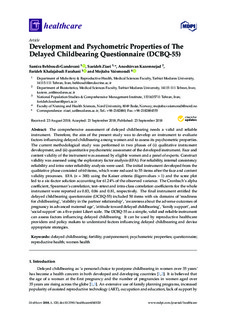Development and Psychometric Properties of The Delayed Childbearing Questionnaire (DCBQ-55)
Behboudi-Gandevani, Samira; Ziaei, Saeideh; Kazemnejad, Anoshirvan; Khalajabadi Farahani, Farideh; Vaismoradi, Mojtaba
Journal article, Peer reviewed
Published version
Permanent lenke
http://hdl.handle.net/11250/2574165Utgivelsesdato
2018Metadata
Vis full innførselSamlinger
Originalversjon
Behboudi-Gandevani, S., Ziaei, S., Kazemnejad, A., Farahani, F. K. & Vaismoradi, M. (2018). Development and psychometric properties of the delayed childbearing questionnaire (DCBQ-55). Healthcare, 6(4): 120. doi: 10.3390/healthcare6040120Sammendrag
The comprehensive assessment of delayed childbearing needs a valid and reliable instrument. Therefore, the aim of the present study was to develop an instrument to evaluate factors influencing delayed childbearing among women and to assess its psychometric properties. The current methodological study was performed in two phases of (i) qualitative instrument development, and (ii) quantitative psychometric assessment of the developed instrument. Face and content validity of the instrument was assessed by eligible women and a panel of experts. Construct validity was assessed using the exploratory factor analysis (EFA). For reliability, internal consistency reliability and intra-rater reliability analysis were used. The initial instrument developed from the qualitative phase consisted of 60 items, which were reduced to 55 items after the face and content validity processes. EFA (n = 300) using the Kaiser criteria (Eigenvalues > 1) and the scree plot led to a six-factor solution accounting for 61.24% of the observed variance. The Cronbach’s alpha coefficient, Spearman’s correlation, test-retest and intra-class correlation coefficients for the whole instrument were reported as 0.83, 0.86 and 0.81, respectively. The final instrument entitled the delayed childbearing questionnaire (DCBQ-55) included 50 items with six domains of ‘readiness for childbearing’, ‘stability in the partner relationship’, ‘awareness about the adverse outcomes of pregnancy in advanced maternal age’, ‘attitude toward delayed childbearing’, ‘family support’, and ‘social support’ on a five-point Likert scale. The DCBQ-55 as a simple, valid and reliable instrument can assess factors influencing delayed childbearing. It can be used by reproductive healthcare providers and policy makers to understand factors influencing delayed childbearing and devise appropriate strategies.

